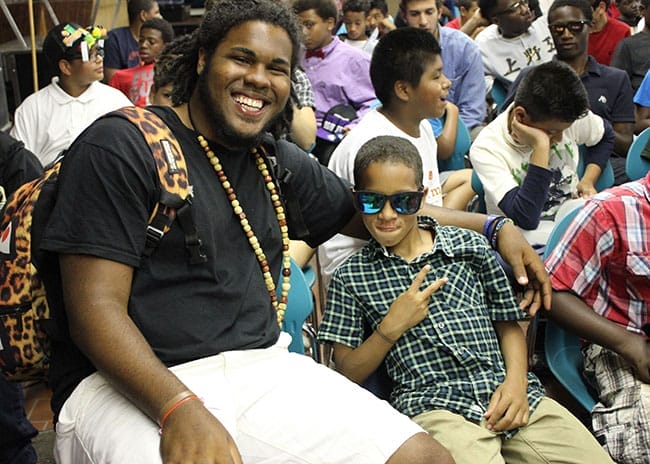Morry Stein never made it home to New York 20 years ago after the annual American Camp Association meeting in Indianapolis. As foundation chairperson and owner of New York’s Camp Echo Lake, Stein was spearheading a fundraising effort so that underprivileged children could experience the overnight camping experience. On Oct. 31, 1994, his return flight crashed.
To honor Morry, his son, Tony Stein, WG’90; his mother; and brothers decided to drive forward with this vision. They called it Project Morry. Stein took the idea to friends, many of them Wharton classmates. Did they like the idea enough to help fund it, even volunteer for it?
“They of course stepped up,” Stein says.
Classmate Tim O’Hara, WG’90, describes Stein as someone everyone knew and respected at Wharton. When Morry died, O’Hara says, the first instinct was: “How can we be supportive of our friend Tony in the wake of this terrible tragedy?”
In effect, it’s become a Class of 1990 project. They’ve remained involved for many reasons. Some classmates had met Morry personally. (In between their two Wharton years, a class contingent spent a summer weekend at Camp Echo Lake.) In large part, too, the class sees itself as one of the most cohesive in Wharton history. Finally, there’s the work of Project Morry.
Its goal isn’t just to provide inner-city kids with a vacation in the woods; the aim is to mentor and guide children on a year-round basis toward a healthy, happy, productive future. During the school year, the kids focus on academic enrichment, personal goal-setting and social action. The summer camp component builds upon those experiences. Project Morry works with kids from grade 4 through high school graduation—nine full years—and has served over 2,000 since inception.
“You’re really changing their perspective on themselves and what their opportunities are,” Stein explains.
“You meet some of these kids who have been through the program, and they’ve done phenomenal things,” says Mark Weinsten, WG’90. Weinsten was best friends with Stein as a kid, worked at Echo Lake when he was in college, then later roomed with Stein at Wharton.
 When measured, Project Morry’s results stagger Doug Present, WG’90. The average high school graduation rate for New York inner-city children is 65 percent; all Project Morry kids graduate. About 80 percent go to college—the other 20 percent come out of high school “with a plan,” Present adds—and 80 percent of the college-bound finish with a degree in four years.
When measured, Project Morry’s results stagger Doug Present, WG’90. The average high school graduation rate for New York inner-city children is 65 percent; all Project Morry kids graduate. About 80 percent go to college—the other 20 percent come out of high school “with a plan,” Present adds—and 80 percent of the college-bound finish with a degree in four years.
Another self-professed “data guy,” O’Hara points to external validation, such as an outcome study by University of North Carolina researchers, which endorsed Project Morry’s year-round development model.
It has taken leadership, from Stein and his classmates, to accomplish such a mission—a dozen or more alumni who have been hands-on. Present, having been on the Project Morry board for the better part of six years, now serves as its president and was “really instrumental” in leading the recent $6 million capital campaign, as well as the purchase of an Upstate New York property to permanently house the four-week camp session, says Stein. Scott Blankman, WG’90, serves as development chair, and Allison Blitzer, C’91, sits on the board. Jay Mantz; Brian McLoughlin; Ron Rosenberg (all WG’90s); Adam Finerman, W’87, L’90, WG’90; and other classmates have long been supportive.
Members of the Class of 1990 will meet to celebrate their involvement at the annual Project Morry Autumn Elegance gala in New York City on Nov. 13. To honor one of their own, O’Hara will be receiving the Morry Award at the ceremony. His involvement dates back to a fundraising event he hosted at his home in the late ’90s, after which he joined the board. Weinsten expects a strong turnout for O’Hara: as many as 400 to 500 people at the dinner in New York—with at least 40 classmates.
“It’s a class project that has really made a difference in the lives of some very deserving children,” Present says.
—Matthew Brodsky

























